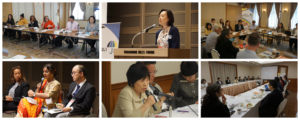 CSEM Advisory Group members Catarina Carvalho, Tomoko Fukuda, and Santosh Kumar Giri participated in the annual Civil Society 20 (C20) Summit alongside many civil society representatives. The C20 is one of the engagement groups for the G20, and the summit provides a space for civil society to feed into the G20 Summit outcomes. This year’s event, held from April 21-23, 2019, attracted participation from over 800 participants representing 40 countries. Capitalizing on the strong focus on Universal Health Coverage (UHC) ahead of the G20 Summit set for June 2019, civil society organizations collectively developed key UHC recommendations which they submitted to the Prime Minister of Japan on the eve of the C20. CSEM members and partners also led and participated in a number of side events during the two-day event.
CSEM Advisory Group members Catarina Carvalho, Tomoko Fukuda, and Santosh Kumar Giri participated in the annual Civil Society 20 (C20) Summit alongside many civil society representatives. The C20 is one of the engagement groups for the G20, and the summit provides a space for civil society to feed into the G20 Summit outcomes. This year’s event, held from April 21-23, 2019, attracted participation from over 800 participants representing 40 countries. Capitalizing on the strong focus on Universal Health Coverage (UHC) ahead of the G20 Summit set for June 2019, civil society organizations collectively developed key UHC recommendations which they submitted to the Prime Minister of Japan on the eve of the C20. CSEM members and partners also led and participated in a number of side events during the two-day event.
G20 Health Working Group Meeting
On April 19, the C20 health working group met high-level officials from the G20 health working group. The Think 20 (T20), the research and policy network of the G20, also participated in the meeting where civil society representatives presented the UHC recommendations. The recommendations comprise two main asks: donor governments should invest at least 0.7% of their GNI on Official Development Assistance (ODA) with a focus on global health, and all governments increase equitable public financing towards at least 5% of GDP as government spending on health. Civil society also presented the Key Asks from the UHC Movement for the UN High-Level Meeting on Universal Health Coverage and Civil Society Priority Actions for the UN High-Level Meeting on Universal Health Coverage. Participants discussed how best to make use of the G20 process to feed into the United Nations High-Level Meeting on Universal Health Coverage (UN HLM on UHC) to be held in September.
Media Briefing
Civil society UHC advocates organized a media briefing on April 19 to highlight the needs of marginalized people and call on governments to commit to UHC that leaves no one behind. Civil society representatives from the transgender community and people living with HIV/AIDS talked about the difficulties faced by marginalized communities in accessing health care, and the need to ensure equitable access to affordable and timely, quality health services for all.
Breakfast Policy Dialogue
The civil society delegation hosted a breakfast policy dialogue where they presented the civil society recommendations for the advancement of UHC. Ten parliamentarians, including the Vice Minister of Foreign Affairs, Honorable Abe Toshiko, were in attendance. The parliamentarians pledged support for the recommendations including that of increased ODA allocations for health, and commitment to lobby for health for all with a focus on women, girls and other vulnerable groups.
Discussions centered around the importance of actively involving all people, communities and civil society in UHC policy planning, decision-making, implementation, monitoring, and evaluation. This approach will ensure accountability, and that no one is left behind. Advocates called for UHC frameworks to be grounded in a human rights-based approach, prioritize primary health care, and ensure gender equality as articulated in both the Key Asks from the UHC Movement for the UN High-Level Meeting on Universal Health Coverage and Civil Society Priority Actions for the UN High-Level Meeting on Universal Health Coverage. They also called for G20 governments to commit to Head of State or government attendance at the United Nations High-Level Meeting on Universal Health Coverage in September 2019. Civil society also emphasized the importance of agreeing on indicators to measure the extent to which the specific needs of vulnerable and neglected populations are being met.

